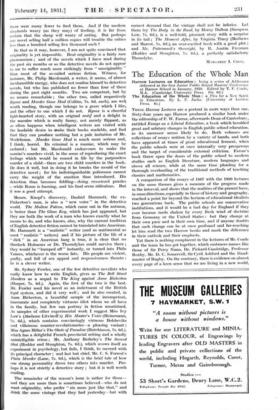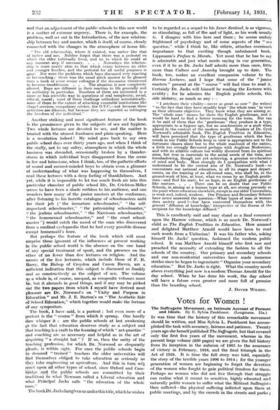The Education of the Whole Man THESE Harrow Lectures are
a portent in more ways than one. Sixty-four years ago Harrow produced a similar book under the editorship of F. W. Farrar, afterwards Dean of Canterbury, entitled Essays on a Liberal Education, a book which heralded great and salutary changes in English public school education, as its successor seems likely to do. Both volumes are collections of essays written by a variety of hands, and both have appeared at times of great educational ferment, when the public schools were at once internally very prosperous and the target of considerable external criticism. Farrar's book threw open the doors of the public school to modern studies such as English literature, modern languages and above all science, while at the same time pleading for a thorough overhauling of the traditional methods of teaching
classics and mathematics.
A comparison of the essays of 1867 with the 1930 lectures on the same themes gives a measure of the progress made in the interval, and shows that the realities of the present have, in some directions, especially in those of history and geography, reached a point far beyond the horizon of educational idealists two generations back. The public schools are conservative
institutions, and it would be a bad day for England if they ever became reeds shaken by every fresh wind of doctrine from Germany or the United States : but they change at
their own pace and in their own time, and if anyone doubts that such change can be at once profound and far-reaching let him read the two Harrow books and mark the difference in their outlook and their emphasis.
Yet there is nothing complacent in the lectures of Mr. Coade and the team he has got together, which embraces names like those of Sir Percy Nunn, Dr. Pickard-Cambridge, Professor Roxby, Mr. D. C. Somervell, Sir Cyril Ashford and the Head- master of Rugby. On the contrary, there is evidence on almost every page of a keen sense that we are living in a new world, and that an adjustment of the public schools to this new world is a matter of extreme urgency. There is, for example, the problem, well set out in the Introduction, of the new relation- ship between boy and master, which is itself, of course, closely connected with the changes in the atmosphere of home life.
" The old relationship, where it existed, was rather like that of father and son. Neither forgot that there was a pedestal on which the elder habitually lived, and on to which he could at any moment step if necessary. . . . Nowadays the relation- ship is more nearly akin to that which exists between an older and younger brother, and the pedestal for all useful purposes is gone. Nor were the problems which boys discussed very exacting or far-reaching ; there was the usual stock answer to be gleaned from a book or some senior colleague if the discussion threatened to become troublesome. . . . The situation is now completely altered. Boys are different in their reaction to life generally and to authority in particular. Numbers of them are interested in a more or less scientific way in questions of real complexity, social, ethical, moral; most of them challenge orthodoxy automatically, dome of them to the extent of attacking venerable institutions like chapel services, compulsory cricket, the O.T.C.—not because these activities are irksome, but because they are regarded as infringing the freedom of the individual."
Another striking and most significant feature of the book
is the prominence given to the subjects of sex and hygiene, Two whole lectures are devoted to sex, and the matter is
treated with the utmost frankness and plain-speaking. Here is a revolution indeed ! My mind goes back to my own public school days over thirty years ago, and when I think of the stuffy, not to say sultry, atmosphere in which the whole business was shrouded, occasionally broken by a thunder- storm in which individual boys disappeared from the scene in lire and brimstone, when I think, too, of the pathetic efforts of sound and earnest-minded boys to obtain even a glimmer of understanding of what was happening to themselves, I
read these lectures with a deep feeling of thankfulness. And yet, while it is impossible to let too much fresh air into this particular chamber of public school life, Dr. Crichton-Miller seems to have been a shade ruthless to his audience, and one wonders how many of the junior masters at the conference, after listening to his horrific catalogue of schoolmasters unfit for their job (" the immature schoolmaster," " the self- important schoolmaster," " the patronizing schoolmaster," "`_the jealous schoolmaster," " the Narcissan schoolmaster," `.` the homosexual schoolmaster," and " the cruel school- master "} would catch the mood of the man who discovered from a medical cyclopaedia that he had every possible disease except housemaid's knee.
But perhaps the feature of the hook which will most surprise those ignorant of the influences at present working in the public school world is the absence on the one hand of any special treatment of sport, and the presence on the other of no fewer than five lectures on religion. And the names of the five lecturers, which include those of F. R.
Barry, the Bishop of Croydon and Canon Raven, are a sufficient indication that this subject is discussed as frankly and as constructively as the subject of sex. The volume a whole is, of course, unequal, as composite volumes must be, but it abounds in good things, and if any may be picked Out the two papers from which I myself have derived most Pleasure are Dr. Norwood's on " Unity and Purpose in Education " and Mr. J. E. Barton's on " The Aesthetic Side
Of School Education," which together would make the fortune Of any symPoSium.
' The book, I have said, is a portent ; but even more of a Portent is the " course " from which it sprang. One hardly dare whisper it : are the public schools at last awakening tb the fact that education deserves study as a subject and that teaching is a craft to the learning of which " net-practice "
and coaching arc as necessary and helpful as in the art of acquiring " a straight bat " ? If so, then the unity of the teaching profession, for which Dr. Norwood so eloquently pleads, is within sight. For once the public schools begin to demand " trained " teachers the older universities will find themselves obliged to take education as seriously as they take engineering or agriculture. And this in turn will
react upon all other types of school, since Oxford and Cam- liridge and the publie schools are committed by their traditions to what Newman called a Liberal education and
what Principal Jacks calls " the education of the whole man."' The hook Dr. Jacks ha3 given us under this title, which he wishes
to be regarded as a sequel to his Inner Sentinel, is as vigorous, as stimulating, as full of ffre and of light, as his work usually is. I disagree with him here and there ; he seems unduly frightened of psychology and of some aspects of the "...` sex question," while I think he, like Others, attaches overmuch importance to that exciting though unbalanced book, Lippmann's Preface to Morals. Yet most that he has to say is admirable and just what needs saying in our generation, even if it be as Dr. Jacks half admits more than once, little more than Culture and Anarchy brought up to date. The book, too, makes an excellent- companion volume to the Harrow Lectures, and I hope that some of the " junior masters " present at the " course " will find time to read it.
Certainly Dr. Jacks will himself be reading the Lectures -with avidity ; for he admires the English public schools, this
side idolatry, as much as any :-
" I attribute their vitality—never so great as now " (he writes) " to the fact that they have steadily kept the whole man ' in view as their ultimate objective. They know what they are aiming at The whole man ' means for them the English gentleman, and it would be hard to find a better meaning for the term. Nor can it be said of them that the ' gentleinan ' they produce is a type, appropriate•to a bygone age, but an anachronism or a snob when placed in the context of the modern world. Readers of Dr. Cyril Norwood's admirable book, The English Tradition in Education, will have perceived that the type of gentleman which the best minds in our Public Schools keep in view is appropriate not to the fortunate classes alone but to the whole manhood of the nation, a little too strongly flavoured perhaps with Anglican Modernism, and with its athletic culture too widely divorced from its spiritual aims, but true in essentials to the social needs of the time, and foreshadowing, though not yet achieving, a genuine co-education of mind and body. Most strongly do I sympathize with what I understand to be the central aim of Dr. Norwood's book—to concentrate our national education, in all its stages and depart- ments, on the training of an all-round man, who shall be, in the ground-work of him, at least, what we mean by an English gentle- man—and find his mate, let us hope, in an English gentleman of like nurture. . . . There can be no doubt that our Public Schools, in aiming at a human type at all, are strong precisely at the point where education elsewhere, except in our older Universities, is weak and, indeed, weakest. Our Primary and Secondary Schools have never answered the question—What types of man or woman does society need 1—but have contented themselves with the general ' diffusion of knowledge,' irrespective of the fitness of the recipient for the knowledge diffused."
This is excellently said and may stand as a final comment upon the Harrow volume, which is as much Dr. Norwbod's child as The English Tradition in Education. How amazed and delighted Matthew Arnold would have been to read such words from a Unitarian! It was his father who, asking himself Dr. Jacks' question, fashioned the modern public school. It was Matthew Arnold himself who first saw and preached the necessity of extending the fashion to all the
schools of the country. Our primary and secondary schools and our non-residential universities have made immense strides since he began to ingeminate " Organize your secondary education." But Dr. Jacks is right. What the country needs above everything just now is a modern Thomas Arnold for the day school. When he has done his work, the day school
J. DOVER WILSON.
















































 Previous page
Previous page